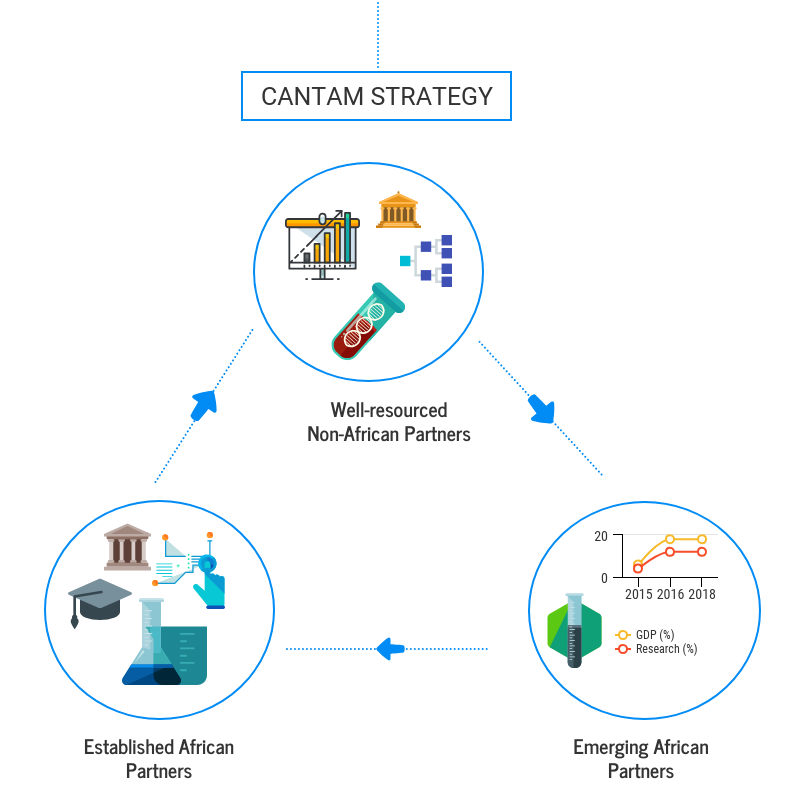About
The clinical research network of excellence for Central Africa (CANTAM) was established in 2008 with the aim of strengthening the individual, institutional and infrastructural capacities in three Central African countries (Cameroon, Gabon and Republic of Congo) along with Germany to conduct clinical trials on tuberculosis (TB),THIV/AIDS and malaria. The basis was to conduct epidemiological studies, and train staff in good clinical and laboratory practices, whilst strengthening the clinical trials infrastructure. Over the years, it appeared necessary to increase partners as specific skills were lacking. With the addition of the Democratic Republic of Congo, Zambia, United Kingdom and the Netherlands, the CANTAM2 network was formed in 2016. In CANTAM2, clinical research capacities on TB were strengthened, and the first multicenter clinical trial on malaria was successfully conducted. Notwithstanding these successes, clinical research in Central Africa is still facing significant gaps, exemplified by the limited number of clinical trials conducted to date.
Mission: To empower the participating Central African institutions to conduct clinical research and clinical trials against poverty-related diseases under internationally established standards.
The aim of CANTAM 3 is to capitalise on the CANTAM1 and CANTAM2 consolidated efforts and to continue to strengthen the network, collaborations, training programs, and infrastructure for the conduct of clinical trials in the field of poverty related diseases in Central Africa.
Given the fragile health systems in Central Africa, new and re-emerging infectious disease outbreaks, such as the COVID-19 pandemic can paralyse health systems and existing structures. CANTAM 3 envisage to synergize our existing efforts at a local and regional level, while considering the strengths and weaknesses of the network identified by our own evaluation. In CANTAM 3 we propose an innovative governance structure that will leverage added responsibilities and ownership to each partner country within the CANTAM network, implementing internal incentives for the best contributors. As a result, CANTAM3 will be able to make a significant contribution in the field of malaria, HIV/AIDS, TB, NTDs as well as other viral diseases, such as COVID-19.
For the years 2021-2023, the objectives of the CANTAM are to:
- Set-up and conduct epidemiological studies on HIV/AIDS, tuberculosis (TB), malaria, neglegted tropical diseases (NTDs) and COVID-19 to collate baseline data for future clinical trials;
- Design and implement training activities necessary to conduct clinical studies on traditional medicines for parasite and viral infections;
- Prepare the sites for future Phase I to IV clinical studies, by specifically strengthening pharmacovigilance including regulatory authorities and national or institutional ethics committees;
- Developing adapted training platforms and mentorship programmes.
Five indicators of success have been identified for CANTAM 3:
- 8 new female scientists established,
- accreditation of new laboratories,
- increase in the number of clinical trials,
- mapping of disease incidences in all CANTAM countries, and
- established pharmacovigilance activities in the region.
The expected key deliverables of CANTAM 3 are:
- A coordinated network of Central African and European institutes sharing SOPs, equipment, data and personnel with the aim of improving clinical research in Central African institutions.
- A large group of highly qualified and well-trained local health researchers.
- Epidemiological data on TB, HIV/AIDS, malaria, NTDs and COVID-19 prevalent in Central African region.
- Central African institutions willing and prepared to conduct Phase I-IV clinical trials.



